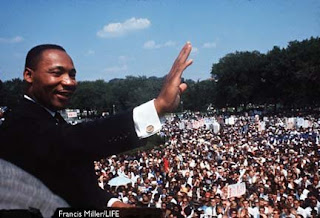Part 1: Nonviolence vs. The Just-War
Part 2: Justice vs. Mercy
Part 3: The War of Mercy
(Disclaimer: I hope that this discussion can lead all of us to a closer look at Church teachings, and so I have tried to keep my thoughts focused upon the Magisterium’s teachings. It’s my hope that any discussion provoked by this post will maintain the same mindset. Though we can find truth in many places, why not go to its source – Christ and his Church? I’ve avoided scripture because as Catholics, our understanding of scripture should first be firmly grounded within Catholic thought. I’ve avoided specific situations of pacifism because they focus on application before understanding. And finally, I’ve avoided judgmental talk of good and evil, of sins and saints. I’m not out to condemn anyone. I’m out to discover truth.)
Recap of Militant, Part 1:
Nonviolence vs. Just-War
(God) does not oppose violence with a stronger violence. He opposes violence precisely with the contrary: with love to the end, his cross . . . With his love — and only thus is it possible — he puts a limit to violence . . . it is the true way of overcoming evil.
– Pope Benedict XVI (26July2006 Zenit)
Christian nonviolence – loving our enemy by dying for him, is the true way to conquer evil.
“Christians, even as they strive to resist and prevent every form of warfare, have no hesitation in recalling that, in the name of an elementary requirement of justice, peoples have a right and even a duty to protect their existence and freedom by proportionate means against an unjust aggressor”
– Pope JPII (1982 Peace Message)
While only love truly defeats evil, justice demands that we defend the innocent. Without justice, can there be love? Without justice, can there be peace?
“There is no peace without justice.
There is no justice without forgiveness.”
– Pope JPII (2005 Peace Message)
I decided to leave the military because I could not reconcile love with justice, I could not reconcile mercy with justice. I still can’t. But I must.
Militant, Part 2:
Justice vs. Mercy
In order to understand the relationship between nonviolence and the just-war theory, I need to understand the relationship between mercy and justice. What does the Church teach? What is justice? What is mercy? How are they related?
“Justice makes whole, it does not destroy; it leads to reconciliation, not to revenge. Upon examination, at its deepest level it is rooted in love, which finds its most significant expression in mercy. Therefore justice, if separated from merciful love, becomes cold and cutting.”
– Pope JPII (1998 Peace Message)”justice is based on love, flows from it and tends towards it”
– Pope JPII (1980 Encyclical Dives in misericordia)
Justice is based on love, ‘merciful love’. This clarifies the relationship, but then again – I still feel as if mercy and justice are opposing forces. How does one reconcile the call of mercy with the demands of justice? How can I be merciful to my enemy while sticking a bayonet into his throat? There is a true contrast between my understanding of mercy and justice. How do I resolve that?
“In this way, mercy is in a certain sense contrasted with God’s justice, and in many cases is shown to be not only more powerful than that justice but also more profound. Even the Old Testament teaches that, although justice is an authentic virtue in man, and in God signifies transcendent perfection nevertheless love is “greater” than justice: greater in the sense that it is primary and fundamental. Love, so to speak, conditions justice and, in the final analysis, justice serves love. The primacy and superiority of love vis-a-vis justice – this is a mark of the whole of revelation – are revealed precisely through mercy.”
– Pope JPII (1980 Encyclical Dives in misericordia)
If merciful love is fundamental and superior to justice, then what does this tell us about the relationship between mercy and justice?
“The experience of the past and of our own time demonstrates that justice alone is not enough, that it can even lead to the negation and destruction of itself, if that deeper power, which is love, is not allowed to shape human life in its various dimensions.”
– Pope JPII (1980 Encyclical Dives in misericordia)
The quest for justice, if unshaped by merciful love, will only produce injustice.
“Mercy constitutes the fundamental content of the messianic message of Christ and the constitutive power of His mission. His disciples and followers understood and practiced mercy in the same way. Mercy never ceased to reveal itself, in their hearts and in their actions, as an especially creative proof of the love which does not allow itself to be “conquered by evil,” but overcomes “evil with good.”
– Pope JPII (1980 Encyclical Dives in misericordia)
Mercy is the foundation of Christian justice. And within this truth, we begin to see the true nature of justice itself. Justice is about persons, not about laws. Justice is the rightly-ordered harmony that exists between persons. Often, these relationships are broken and injustice reigns. But the Church teaches that justice can only be restored through mercy. Only in merciful love can relationships be truly healed. Only a justice founded upon love can lead to peace.
“Thus there is no contradiction between forgiveness and justice. Forgiveness neither eliminates nor lessens the need for the reparation which justice requires, but seeks to reintegrate individuals and groups into society, and States into the community of Nations.”
– Pope JPII (1997 Peace Message)
 Forgiveness is the prerequisite for justice. Mercy takes primacy over justice, for without mercy and forgiveness, there can be no justice.
Forgiveness is the prerequisite for justice. Mercy takes primacy over justice, for without mercy and forgiveness, there can be no justice.
“There is no peace without justice.
There is no justice without forgiveness.”
– Pope JPII (2005 Peace Message)
If mercy is required for justice, then the just-war theory must be founded upon merciful love of enemies. Otherwise, its goal of restoring justice is destined to failure. But there is another side to this relationship: the goal of mercy must be justice.
“Properly understood, justice constitutes, so to speak, the goal of forgiveness. In no passage of the Gospel message does forgiveness, or mercy as its source, mean indulgence towards evil, towards scandals, towards injury or insult.
– Pope JPII (1980 Encyclical Dives in misericordia)
Mercy cannot indulge evil – it must combat evil. Mercy cannot ignore injury or insult, it cannot ignore injustice. Rather, mercy must be aimed at the restoration of justice, at the restoration of the relationships between persons.
 What is the relationship between nonviolence and the just-war, between mercy and justice?
What is the relationship between nonviolence and the just-war, between mercy and justice?
Be peaceful, therefore, in warring, so that you may vanquish those whom you war against, and bring them to the prosperity of peace.
– St. Augustine (Ep. ad Bonif. clxxxix)
The only war capable of restoring justice is a war founded upon mercy and aimed at justice: a just-war of nonviolence. Part III explores the paradox of the cross, where war meets nonviolence: The War of Mercy.












